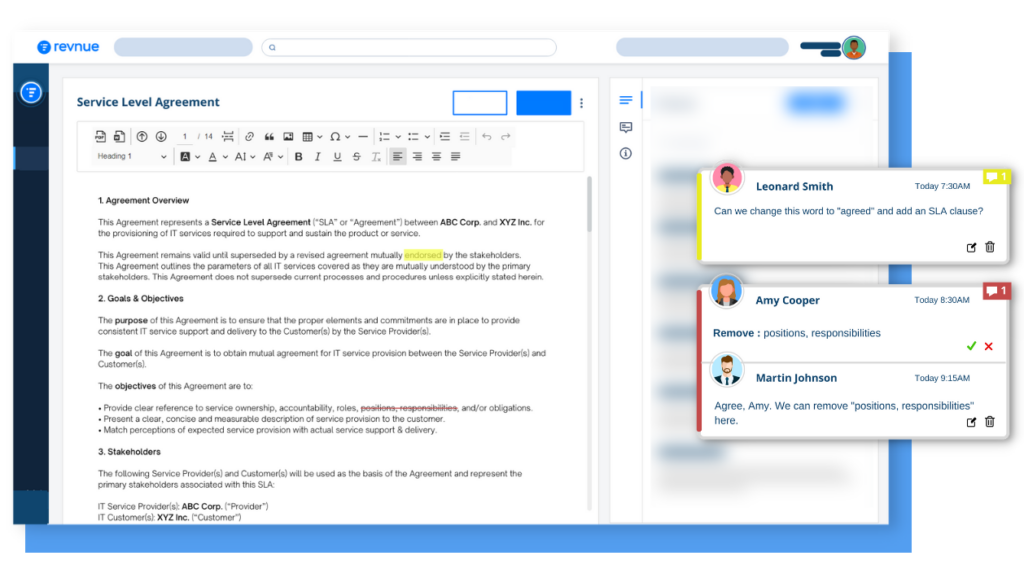Businesses that don’t use contracts or manage them properly can face many challenges. Contracts help strengthen relationships and create a good workflow within the organization. So, every business must understand what contracts and agreements are and how they can benefit from them.
We’ve all come across the words contract and agreement, but what is the difference between agreement and contract? These terms have similarities and differences. However, you must choose between contracts and agreements to maximize their benefits and protect your business.
A contract is formal and must adhere to the policies of the government. An agreement is informal and usually does not involve laws because there is no written agreement or signature. Both can be used for two or more parties to agree on a deal strengthening their unities. However, a formal agreement takes into account the laws.
Let’s understand the difference with an example. If Mike, a business owner, asks someone he knows to do some work for him. He gives specific instructions for one project. The friend, Elizabeth, agrees to do the job because they are close friends, and she is just helping a friend out. It is also a one-time project and does not take hours to do. The agreement is that she decides to accept the project. In this agreement, nothing is written down or states what will happen if she doesn’t complete the project or what will happen after the project is completed. This gives Elizabeth the liberty to take her time to do the project, and there is no pressure or expectations, just friends helping each other out.
Read Also: Service Level Agreement (SLA): The Ultimate Guide
In this situation, a contract would be if Mike wrote a written agreement for Elizabeth to sign. The contract states the number of hours Elizabeth must work on for the project, how much she will earn, and what will happen if she cannot complete the project. Both parties sign the contract, and if any issues arise the contract is legally binding and so can be used in court.
What is an agreement?
In an agreement, it is usually a verbal discussion between two parties that reach common ground. They can discuss what business they want to get into or what is expected of each of them. When each party included agrees, they may shake hands, nod, or simply say, “I’m in.”
The downside to agreeing and not having a contract is that it can create confusion. The things said in an agreement might not be clear enough for everyone because there is no proof and a person can deny the agreement, and no actual plan can push through.
If the conversation happened without any witnesses, many details could be forgotten about, parties involved could change their minds or even back out of the agreement, and they can also interchange dates or miss milestones and deadlines.
Read Also: What is Contract Administration? A Comprehensive Guide
You might be thinking, so why would anyone even consider an agreement? Well, agreements have their benefits. They are not completely bad for business.
1. Informal
Informality creates a comfortable environment for all parties involved. They can speak whatever is on their mind and lay out their plans with each other. They may develop a close friendship beforehand, making it easier to agree on something.
2. Freedom to Make Changes as Much as Possible
In an agreement, changes are still allowed. Someone may have forgotten an important detail to include, or maybe there is a conflict of interest or schedule, all of which can still be changed. Revisiting an agreement makes it convenient to make these adjustments in case things do not go as planned. All of which can be done before you start to stabilize the agreement.
3. Casual Ideas
Brainstorming is usually done casually, so why can’t agreements? When you are free to be casual, there are fewer limits and terms and conditions to think about. Raw ideas and thoughts can help decipher what’s important for each party. Casual ideas usually happen in more comfortable setups, so it makes parties involved comfortable enough to discuss details and strategize the next steps of the agreement.
What is a contract?
A contract is legally binding and goes through nine stages called contract lifecycle management. The eight steps are contract creation, review, approval, execution, storage, records management, search, reporting, and renewal.
All contracts must comply with these steps to create a legitimate contract. It enables extensive collaboration between parties involved because users can have access to the contracts on a platform. Parties involved can then get updates on the status of the contract and review, make suggestions, and approve when needed. Everything discussed in the contract meets the requirements of both parties and includes clauses that abide by the law. It also ends with a signature, and once all terms and conditions are approved can not be changed easily.
For all businesses, a contract is a must. You can have the option of having an agreement for short-term or casual arrangements. But for employees, vendors, clients, or business partnerships, contracts are a must. Without contracts, legal risks can arise.
Here are the benefits of contracts:
1. Avoids Legal Risks
Contracts include clauses and so make it clear to all parties what will happen if the terms and conditions are not met. It also protects both parties when any issues arise or if anyone changes their minds or wants to make any changes.
2. Expectations for Each Member
Before signing a contract, each member can review the document, and come to an agreement and understanding of what is expected of them. The third-party must be comfortable with everything written in the contract, and it must be fair between all parties.

Contract Authoring and Negotiation – Create, Collaborate, Negotiate and Execute contracts with ease and speed
3. Specific Details
For those of you who have suppliers or vendors, details are important. Deliveries must be made on time, how much needs to be delivered and that payments are clear. A contract must state what happens if these specific requirements are not met. Without a clear understanding, it can cause a company revenue loss and affect relationships with suppliers and partners.
Conclusion
Both contracts and agreements can be used depending on the situation. For formal situations and for it to be legally binding, you must use a contract. It must include all steps of the CLM, and all parties must reach a mutual understanding. An agreement, on the other hand, is not legally binding, but all parties do still reach common grounds. Also an agreement can be made into a contract if both parties want to make everything official, and want to be protected in case of non-compliance by either party.
For those looking for a platform to help create contracts, check out Revnue. Revnue is an AI-based software that provides end-to-end CLM. The pre-signature phase was recently released, and users can now create, review and approve contracts, all on one platform.








